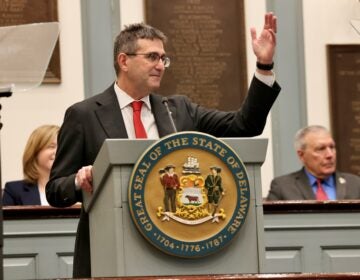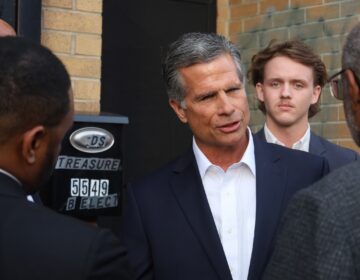Lots of tips on how to live sanely in Trumplandia
The pollsters at Pew recently reported that 68 percent of Americans are suffering from news exhaustion, and that jibes with what I witness on an anecdotal basis.

Edvard Munch's 'The Scream' is seen as it is hung for display at Sotheby's Auction Rooms in London, Thursday, April 12, 2012. (AP Photo/Kirsty Wigglesworth)
The pollsters at Pew recently reported that 68 percent of Americans are suffering from news exhaustion, and that jibes with what I witness on an anecdotal basis. I don’t presume to everyone, but many of you probably agree that conversations with friends these days are sometimes strained. The dialogue often goes something like this:
“We’ve gotta talk about Trump and everything that’s going on.”
“I’m so sick of it. Must we?”
“How can we not?”
“Can’t we talk about something else?”
Sure we can. And we do. We have lives to live, after all, and we want to live them well. But we’re also well aware (or we certainly should be) that western democracy at home and the western peacekeeping alliance abroad are under unprecedented attack by destructive forces in Washington and Moscow. With each passing week, the challenge facing each of us becomes more urgent: What’s the best way to remain vigilant and still lead a sane life? What’s the best way to balance obligations to self, friends, and family with the obligations of citizenship? Is it possible to monitor the avalanche of news without going nuts? How can we best calibrate these factors in year two of Trumplandia?
I talked about this on Facebook over the weekend; not surprisingly, nearly 100 Friends shared their angst and exhaustion. (My apologies for not quoting everyone.) For instance, Brian Rademaekers says: “It’s gotten to the point where I don’t even read books anymore.” He’s perpetually battling “news addiction,” which he defines as “the constant temptation to see what’s happening.” Janet Forrest says: “It’s like something even more terrible will happen if I don’t know what’s going on.” Carol Hodes says: “I have had to address the physical aspects of Trump-stress and wear a nightguard to protect my teeth from getting gnawed.” Tom Torok is addicted to cable, hates it “when CNN and MSNBC kick in to repeats” around midnight, and in the wee hours he’ll sometimes “switch on CNN with this question in mind: ‘Is he dead yet?'”
I should stipulate that not everyone feels unduly stressed; some people feel no urge to escape. Jeff Price says: “The more (news), the better!” He says this is no time for people to be “sheltering (themselves) from daily developments.” Bonny Davis loves cable TV: “I sometimes leave it on all night…There are days I never turn it off.” And Wanda Hammoud says: “Staying in reality is my comfort zone. I have been watching the news every day since the election…Every part of our existence is under attack through politics. Take a walk in the park and you think about the current war on our environment by the deniers in power. Great journalists are keeping us awake.”
But there is also a broadly shared desire “to balance the madness” (Donna Gentile O’Donnell), a desire “to create create a space that feels purposeful” (Scott Williams) – and I concur, despite the fact that I’m paid to overdose on news. Most people offered random sanity tips, none of which are necessarily curative. And the first step is to reduce the news flow, or at least to exercise more quality control.
One popular piece of advice, as articulated by Steve Rosenthal: “No cable news. Repeat, no cable news ever.” Peter Landry seconds that: “I never watch ShoutTV on cable.” Phaedra Trethan agrees: “No cable news, ever. Even before 2016, I found it to be stress-inducing and frankly a waste of time.” Karen Rile says: “Something about large talking heads in the house is particularly stressful.” Glenn Burkins says: “In our house, my wife keeps CNN on constantly, but I have limited my time with (cable) to the time it takes me to walk across our family room.” Some of my respondents gave shout-outs to Rachel Maddow, Brian Williams, and Nicolle Wallace (I do like Wallace, a career Republican who has great Republican sources), but there seems to be a general belief (which I endorse) that cable commentary is shrill, speculative, repetitive, and therefore easily culled.
Another favorite: Staying off, or reducing reliance on, Twitter. That’s easier for some than others. I’m pro-Twitter, at least for its usefulness as a breaking news bulletin board. But it’s also a bottomless rabbit hole for ranters, and much time can be wasted crafting pithy ripostes. As Tom Felicetti says, Twitter all too often is a haven for “polarizing emotional non-factual” people. Murray Dubin finds that “closing that Twitter window makes me a little less nuts.”
Matthew Cooper, and others, have zapped the Twitter app off their phones. Some people use their phones more qualitatively; Maria Cardenas says, “I get my news strictly from the BBC app, The Globalist, and NPR podcasts…Sometimes I feel out of the loop but I prefer it to every gory detail.” And some people have found ways to reduce their phone exposure; Bambi L. Feaster says, “I’ve taken to leaving my phone on my desk when I walk the dog…The dog is happier because we play more, walk more, and I’m not impatient.”
Walking the dog is one way to disconnect, but the list of diversions is blessedly lengthy. Baseball appears to be a favorite. Jeff Brown says the Trump news is “relentless and depressing,” so he signed up for the DirecTV MLB package, which is “more soothing,” and I can attest that watching the MLB Network on basic cable is a guaranteed way to dwell for hours in an apolitical bubble. Cooking and gardening and TV binging are big. Steve Rosenthal watches old Johnny Carson shows. Bill Marston likes live jazz. Exercise is also big. Tom Harkins likes long bike rides. And Miriam Hill says, “I am swimming a lot more laps in the pool. My minimum pool workout used to be 1,000 meters. In the last few months, I’ve doubled that on some days just to increase the amount of time my brain gets a break.”
As for me, I’m not the best person to advise anyone on the proper calibration. My latest idea of escapist reading was Daniel Silva’s excellent new spy novel, “The Other Woman” – which turned out to be a parallel-universe tale of Russia’s penetration of America. In the author’s note, he writes: “Russia under Vladimir Putin is both revanchist and paranoid, a dangerous combination…When Putin sows political chaos in Western Europe and seeks to disrupt and discredit an American election, he is reaching deep in the KGB’s playbook.”
I suppose I can escape, albeit temporarily, by hanging with the grandchildren – another popular tip. But my oldest one, who is five, recently informed me with great solemnity: “There are bad guys in the world. You know that, right?” I managed a reassuring smile. But I said to myself: “Yeah. I think I read something about that.”
Perhaps cockeyed optimism is the best escape of all. As Phaedra Trethan says that “while we all know our history is rife with racism, injustice, corruption and genocide, I still believe that arc bends toward justice. Maybe because if I didn’t believe that, I’d have drawn a nice warm bath, gotten in the tub, and opened my wrists by now.”
WHYY is your source for fact-based, in-depth journalism and information. As a nonprofit organization, we rely on financial support from readers like you. Please give today.




